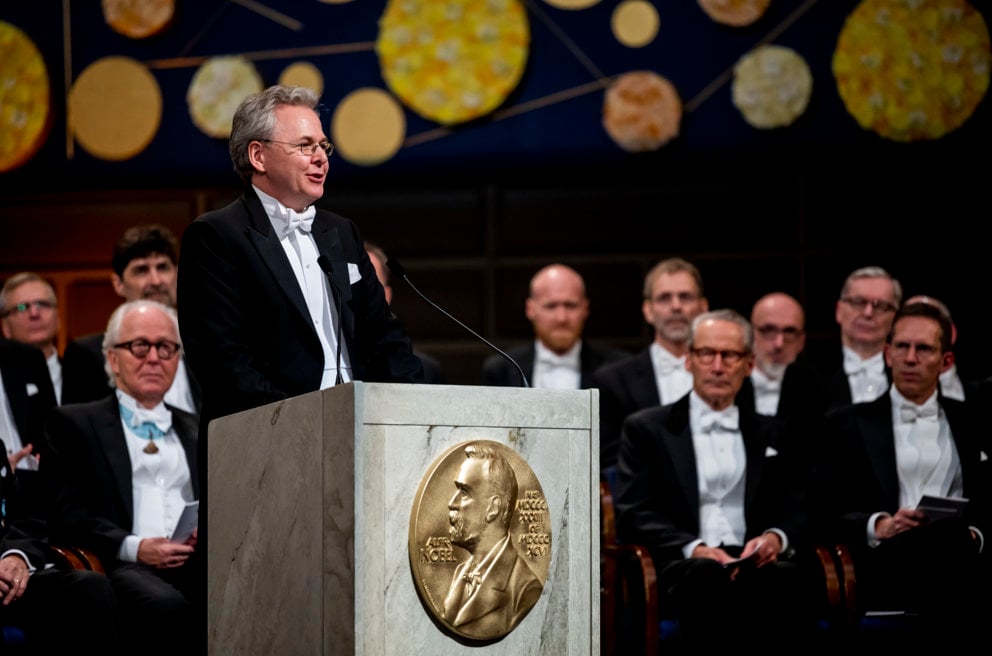Award ceremony speech

Professor Olof Ramström delivering the presentation speech for the 2019 Nobel Prize in Chemistry at Konserthuset Stockholm on 10 December 2019.
© Nobel Media. Photo: Alexander Mahmoud.
English
Swedish
Presentation Speech by Professor Olof Ramström, Member of the Royal Swedish Academy of Sciences; Member of the Nobel Committee for Chemistry, 10 December 2019.
Your Majesties, Your Royal Highnesses, Esteemed Nobel Laureates, Ladies and Gentlemen,
Imagine a world in which we have unlimited access to stored electric energy wherever we are. Perhaps the electricity is also coming from renewable energy sources that fluctuate over time, such as wind and sunlight, resulting in an uneven power supply. Not so long ago, this was very much a dream, and repeatedly storing large amounts of electricity for on-demand use was a major challenge. Today, however, we have come a long way to meet this goal, and the lithium-ion battery has increasingly become a viable solution.
Ever since Volta’s pile, we have known that batteries can store and convert chemical energy into electricity. Still, it has proven to be tremendously arduous to develop efficient and rechargeable batteries. This is certainly true for the powerful lithium-ion battery, and many groundbreaking discoveries have been required to enable its development.
As the name implies, lithium-ion batteries are based on the element lithium in its ionic form. Around 200 years ago, this element was discovered by Arfwedson and Berzelius while analysing a mineral from the island of Utö in the Stockholm archipelago. They also named the element after the Greek word for “stone”, even though lithium is our lightest metal. It soon became evident that lithium has several remarkable properties. The atoms are among the smallest we have, and their propensity for releasing an electron makes the element reactive, yet suitable for electrochemistry. Scientists gradually realised that these important properties would be useful for batteries with very high capacity.
Our Laureates took hold of these challenges and man- aged to tame lithium into what eventually became the lithium-ion battery. Stanley Whittingham worked with ion transport and superconductivity and discovered a titanium-containing material that could efficiently take up and release lithium ions. This revelation led to a lithium-based battery with a potential of around 2 V. John Goodenough identified new, stable, lithium ion-binding electrode materials based on oxides and phosphates and was able to demonstrate batteries with potentials of over 4 V. Akira Yoshino developed stable carbon-based materials able to host lithium ions and replace reactive lithium metal. In combination with oxide electrodes, he was then able to show lithium-ion cells with high voltage. These discoveries laid the groundwork for the modern lithium-ion battery.
The discoveries of our Laureates have led to a dramatic change in our society. They have contributed to the so-called “mobile revolution”, which has resulted in powerful, portable electronics. They have enabled the transition we are witnessing in the transport sector, with increased use of electrically-driven vehicles. They have simplified our use of reusable energy sources for the temporary storage of electrical energy and its subsequent on-demand use. This Prize is also a clear example of the fact that many crucial technical advances that transform our everyday lives have their origin in chemistry. Only with in-depth knowledge of the proper- ties of metals and metal ions, their electrochemistry and interactions with different substances and materials could this progress be made. These chemistry dis- coveries have thus really paved the way for a simplified everyday life and an improvement in our environment.
John Goodenough, Stanley Whittingham and Akira Yoshino:
You have made groundbreaking discoveries in chemistry that has led to the development of the lithium-ion battery. This is a truly great achievement for the benefit of humankind. On behalf of the Royal Swedish Academy of Sciences I wish to convey to you our warmest congratulations. May I now ask you to step forward and receive your Nobel Prizes from the hands of His Majesty the King.
Nobel Prizes and laureates
Six prizes were awarded for achievements that have conferred the greatest benefit to humankind. The 12 laureates' work and discoveries range from proteins' structures and machine learning to fighting for a world free of nuclear weapons.
See them all presented here.
